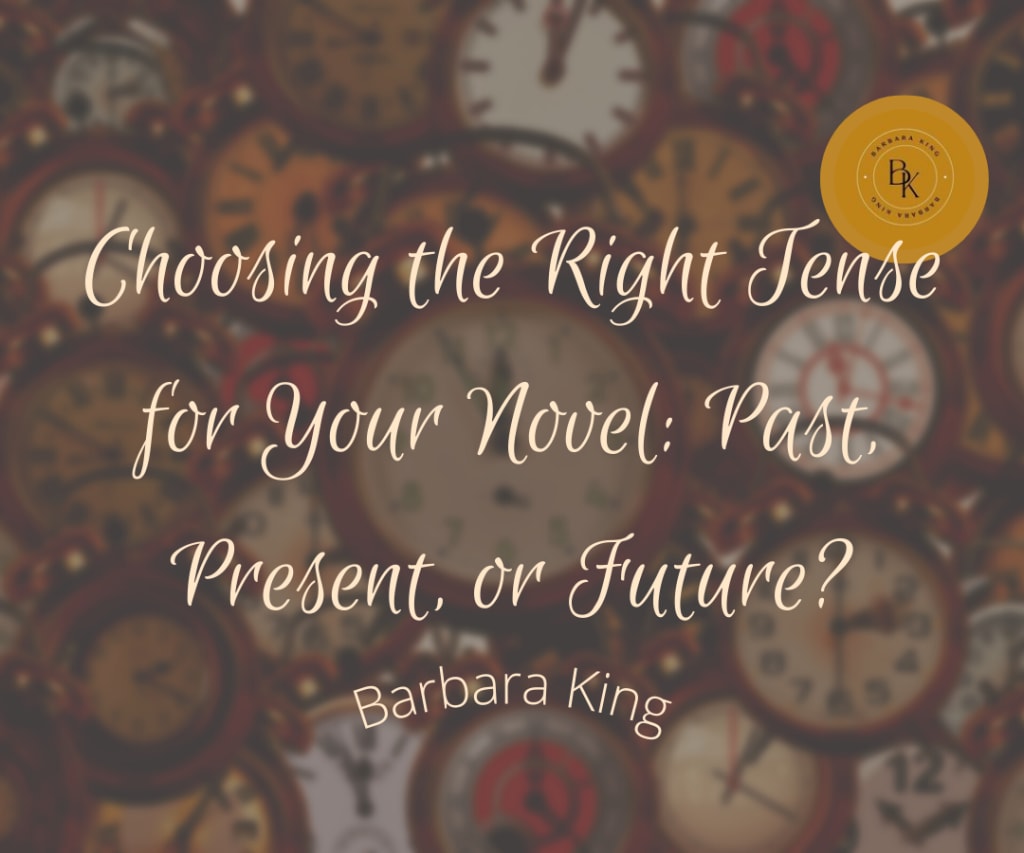Choosing the Right Tense for Your Novel: Past, Present, or Future?
You need to understand the options to make the best choice for your novel.

If there was one thing from my second creative writing class that is going to haunt me for the rest of my career it would be my Professors scribbled handwriting on the coversheet of most of the work that I turned in with the words STOP SWITCHING TENSES written in increasingly larger letters as the semester went on.
I don't know what it was that made it so I couldn't just pick a tense and stick to it, but even now more years later than I want to admit to, I'm still doing the same thing.
It sure makes a big pain in the backside every time I go to edit my work. I even went as far as to place the chosen tense in the heading so that it'll be a constant reminder to check which one I am writing.
If you're lucky, your reader won't notice how many times you switched from Sally walked into the old house to Sally walks into the old house.
So what's the big deal about choosing a tense?
Choosing the right tense for your story is going to affect the way your reader experiences the events in your story such as - Did these events already happen? Are they happening now? Are they going to happen in the future?
What Are The Three Tenses?
Simply put, as you can see by the title the three tenses for novels are past, present, and future and each one has its reasons for being chosen for your novel with its impact on the story's tone and the pacing.
Past Tense
Past tense is the most common in fiction writing and in my opinion, the easiest to write. It's easier to tell a story of the things that happened such as when we tell our partners about our day rather than telling them about it at the moment. Past tense can create a sense of distance between the reader and the events of the story and allow the reader a more objective view of the events.
Samantha walked into the old house, her heart pounding in her chest. She had always been afraid of the dark, but she knew she had to find the truth.
Present Tense
Present tense holds the reader a bit closer and can help give your novel a sense of immediacy and urgency by making the reader more involved in the story, you can say they're living it hands-on and are at that moment feeling the actions of the story as they happen to your characters. The present tense is most often used in thrillers, suspense novels, and horror novels where tension is an important element of the story.
Samantha walks into the old house, her heart pounding in her chest. She has always been afraid of the dark, but she knows she has to find the truth.
Future Tense
This one is a bit of an odd one and the one used least in fiction writing and after a brief internet search, I didn't come across any novels written in this tense. Writing in the future tense can create a sense of anticipation for events as they unfold in the novel.
Samantha will walk into the old house, her heart pounding in her chest. She will always be afraid of the dark, but she will know she has to find the truth.
Which Tense Is The Right Tense?
The tense you choose for your novel is going to boil down to three things.
Genre
Some genres have an expected tense for their stories such as romance or historical fiction which falls into the past tense whereas science fiction, thriller, and fantasy are more likely to use the present tense.
Narrative Voice
The tense you choose can also depend on the narrative voice you're using. First-person point of view often uses the present tense, while third-person point of view can use either the past or present tense
Personal Preference
Ultimately the tense you choose can come down to whichever fits your writing style best. If you find that at the end of your first few paragraphs, you've automatically written your story in the past tense then that might just be what's easier for you to write, and the same is true for the opposite.
--
The best thing about writing in either tense is that whichever you chose isn't permanent. You can be like me and do a mix of both past tense and present tense and drive yourself up a wall when editing time comes, but it works for me because if I stop to think about which tense I'm writing in - I may just forget where I was trying to go in the scene before I was able to write it as I was too caught up in thinking about whether she just walked into the room or if she walks into the room.
No matter what you do or did or are going to do the most important thing to remember is that you need to write and keep on writing.
With love,
B.K. xo xo
*If you've liked what you read you can show your support by subscribing, pledging your support, or leaving me a tip that directly supports and aids me as a writer.
By joining Vocal+ you can earn more per read on every story you publish on Vocal.
Click my link to start your 7-day free trial today and start earning more for your stories.
_____________________________________________
This story was originally posted on Medium.
If you would like to experience Medium yourself, consider supporting me and thousands of other writers by signing up for a membership. It only costs $5 per month, it supports us writers, greatly, and you have the chance to make money with your own writing as well. By signing up with this link, you'll support me directly with a portion of your fee, it won't cost you more. If you do so, thank you a million times!
If you love what you've read you can also show your support by buying me a cup of coffee to fuel my writing.
https://www.buymeacoffee.com/barbaraking
*Contains Affiliate Links
About the Creator
Barbara King
Barbara King is a full-time writing coach and novelist. King is a recent college graduate from Southern New Hampshire University where she earned her BA in Creative Writing.
Reader insights
Outstanding
Excellent work. Looking forward to reading more!
Top insights
Expert insights and opinions
Arguments were carefully researched and presented
Compelling and original writing
Creative use of language & vocab
Easy to read and follow
Well-structured & engaging content
Masterful proofreading
Zero grammar & spelling mistakes
On-point and relevant
Writing reflected the title & theme







Comments (6)
very well done. i have problems sticking with the right tense and this helps clarify. thank you.
With the onset of AI, I think the future tense can be more interesting. But, to be frank I thought stories are all written in past tense (story means past - my thought)
Thank you for this. I am new to writing novels and I didn't even know they could be written in tenses other than the past tense. I have always just noticed past tense when I looked for tense while reading.
Great post. I think this is something I struggle with the most! I am slowly working on a novel, and I currently have two different drafts in two different tenses. It makes a huge difference in how they read, and I can't choose haha.
Thank you. This is something I am wrestling with right now, so very timely!
It can be hard to stick with one path, but it is a good practice to check your work for consistency. Thanks!